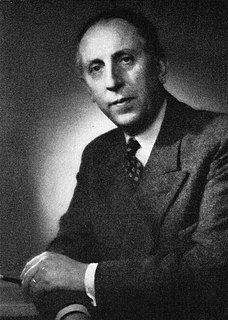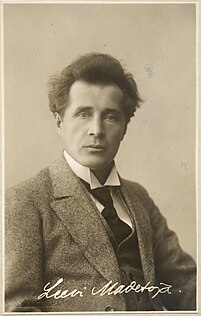| Look up elegy in Wiktionary, the free dictionary. |
An elegy is a poem of mourning.
Contents
Elegy, Elegie, or Elegies may also refer to:
| Look up elegy in Wiktionary, the free dictionary. |
An elegy is a poem of mourning.
Elegy, Elegie, or Elegies may also refer to:

A string orchestra is an orchestra consisting solely of a string section made up of the bowed strings used in Western Classical music. The instruments of such an orchestra are most often the following: the violin, which is divided into first and second violin players, the viola, the cello, and usually, but not always, the double bass.

Concert champêtre, FP 49, is a harpsichord concerto by Francis Poulenc, which also exists in a version for piano solo with very slight changes in the solo part.

Albert Charles Paul Marie Roussel was a French composer. He spent seven years as a midshipman, turned to music as an adult, and became one of the most prominent French composers of the interwar period. His early works were strongly influenced by the impressionism of Debussy and Ravel, while he later turned toward neoclassicism.

Henri Constant Gabriel Pierné was a French composer, conductor, pianist and organist.

Hilding Constantin Rosenberg was a Swedish composer and conductor. He is commonly regarded as the first Swedish modernist composer, and one of the most influential figures in 20th-century classical music in Sweden.
Marcel Mihalovici was a French composer born in Romania. He was discovered by George Enescu in Bucharest. He moved to Paris in 1919 to study under Vincent d'Indy. His works include his Sonata number 1 for violin and piano (1920), Mélusine opera, his 1st string quartet (1923), 2nd string quartet (1931), Sonata number 2 for violin and piano (1941), Sonata for violin and cello (1944), Phèdre Opera (1949), Étude in two parts for piano and instrumental ensemble (1951) and Esercizio per archi (1960). Many of his piano works were first performed by his wife, the concert pianist Monique Haas.
Melia Watras is a prominent American violist, composer and professor of viola. She is a soloist, chamber musician and recording artist, who has commissioned, premiered and recorded numerous new compositions, and appeared at venues such as Carnegie Hall, Weill Recital Hall and Alice Tully Hall. Her compositions have been performed in the United States and Europe. Educated at Indiana University and the Juilliard School, Watras has been on the faculty of the University of Washington in Seattle since 2004.

Elegia, Op. 4/1, is a composition for string orchestra by the Finnish composer Leevi Madetoja, who wrote the piece in 1909 during his student years. On 10 January 1910, Robert Kajanus, chief conductor of the Helsinki Orchestral Society, premiered the Elegia to great acclaim, with the piece described as the "first master work" of a budding "natural orchestral composer". Madetoja subsequently designated the Elegia as the first number in his four-movement Sinfoninen sarja, Op. 4, which the Helsinki Orchestral Society performed in its entirety under the composer's baton on 26 September 1910. The suite's three other numbers are virtually unknown, and the Elegia typically is performed as a stand-alone concert piece. Stylistically reminiscent of Tchaikovsky, it is, to date, Madetoja's most recorded and well-known orchestral composition, as well as the most enduringly popular of his many miniatures.
Louis-Noël Belaubre was a French classical pianist and composer.